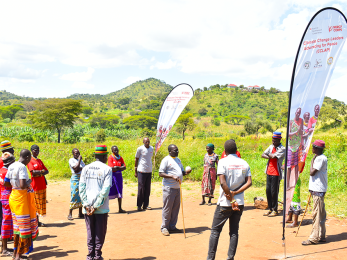Weathering the COVID-19 Storm
Improving Livelihoods and Strengthening Governance

October 28, 2021
This report highlights Year 3 achievements of the USAID-funded Livestock Market Systems (LMS) Program which is being implemented in Isiolo, Wajir, Turkana, Marsabit, and Garissa Counties in Northern Kenya. The achievements are featured under the three main objectives of the program which are strengthened institutions, systems and governance, improved human capital, and collaborative action and learning for community empowerment.
Mercy Corps, which is implementing LMS program under the objective of Strengthening Community Capacities through Resilience and Growth (SCCRG), achieved the following;
- Implementing the Ward Based Development Planning Approach - In the past year, LMS continued to strengthen and finalize the Ward Planning Committees (WPCs) in the five counties. All WPCs are now registered with the government as Community Based Organizations and recognized by communities and County Government as legitimate representatives on matters pertaining to development. Ward Administrators also provided offices to the WPCs, and in some cases the county governments provided furniture.
- Integration of Ward Development Plans into Annual Development Plans and Allocation of Resources to WPCs - The program conducted several meetings with different County Governments and Members of County Assemblies (MCAs) to present the Ward Development Plans (WDPs), influence the integration of key community priorities into the ADP, and support the allocation of resources to these priorities.
- In the third year, LMS-SCCRG directly engaged approximately 16,686 individuals, composed of 11,604 adolescent girls and young women, 189 WPC members, 33 Rural Entrepreneur Access Project (REAP ) village mentors and 4,860 ultra-poor women, as advocacy champions to protect nutrition gains in the face of drought, address drivers of chronic undernutrition, spearhead WASH and nutrition social behavior change communication, support county initiatives for improved education and promote basic literacy and life skills.
- Supported communities to protect nutrition gains in face of drought - Ward Planning Committees advocates for WASH and Nutrition: Through Ward Planning Committees (WPCs) influence and advocacy, the five county governments committed approximately $797,072 to support water, sanitation, and irrigation infrastructure to improve WASH and nutrition. SCCRG supported the WPCs to develop influence and advocacy plans to ensure that the county governments include their priorities in the Annual Development Plans. The WPCs followed up this effort by arranging appointments with their MCAs, chief officers, CECs, and county governors.


